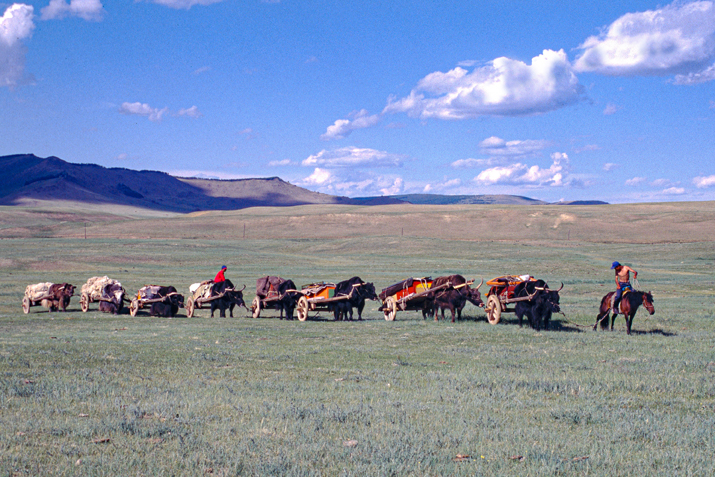
Long drinks and a cigar for your birthday
N 49°26'296'' E 100°56'540''
Day: 62
Sunrise:
07:04
Sunset:
19:12
As the crow flies:
15,22
Daily kilometers:
22
Total kilometers:
717
Soil condition:
Gravel, stones
Temperature – Day (maximum):
27°C
Temperature – day (minimum):
24°C
Temperature – Night:
3°C
Latitude:
49°26’296”
Longitude:
100°56’540”
Maximum height:
1257 m above sea level
Time of departure:
12:30
Arrival time:
17:30
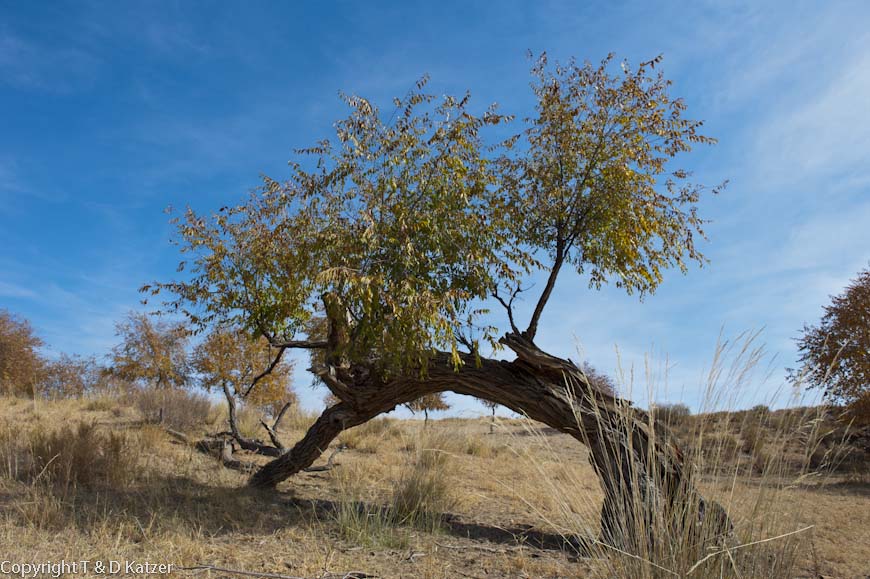
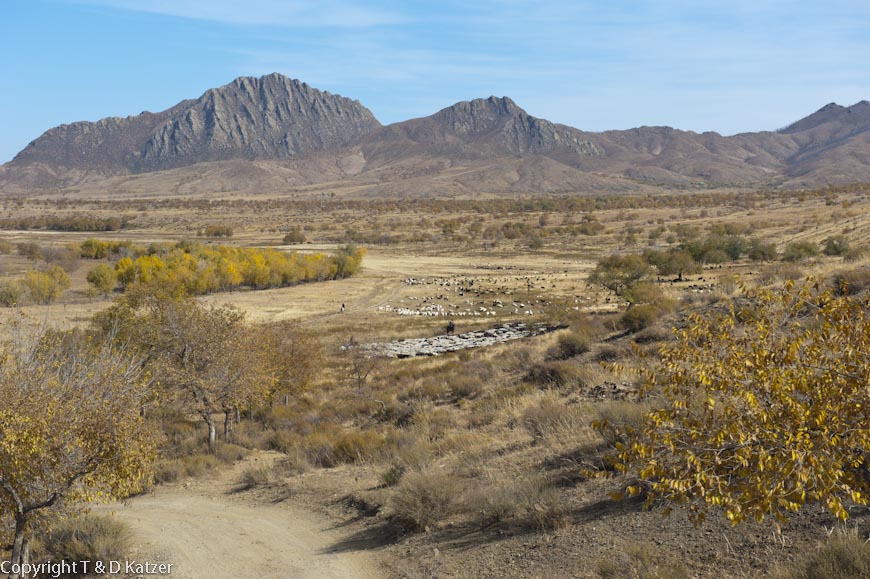
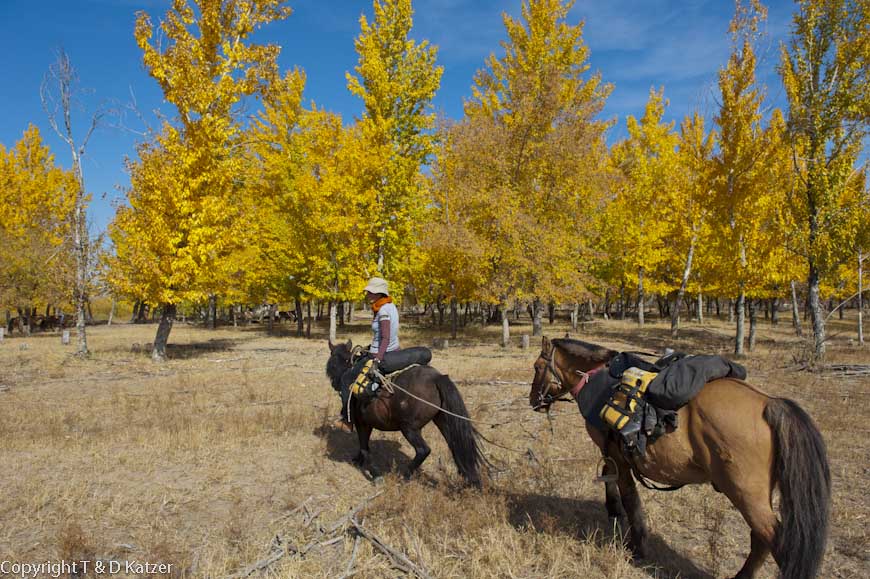

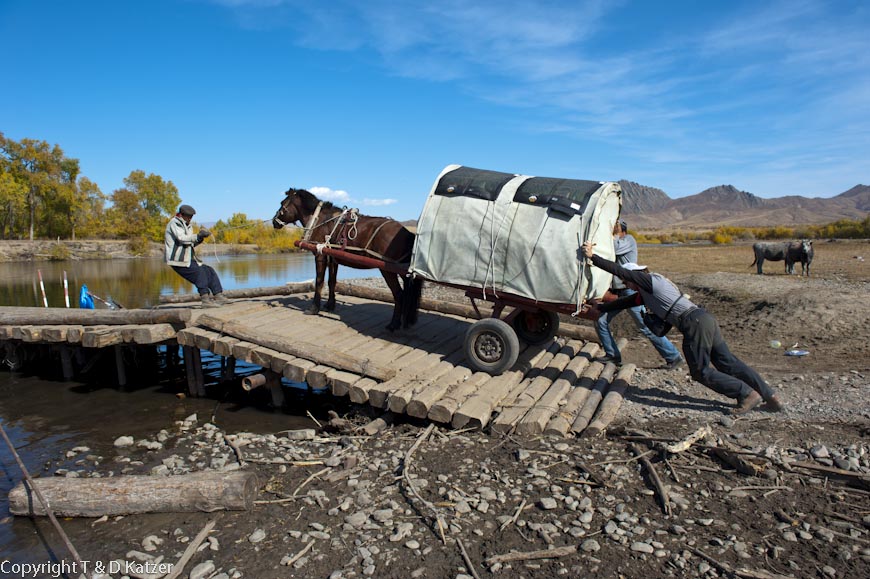

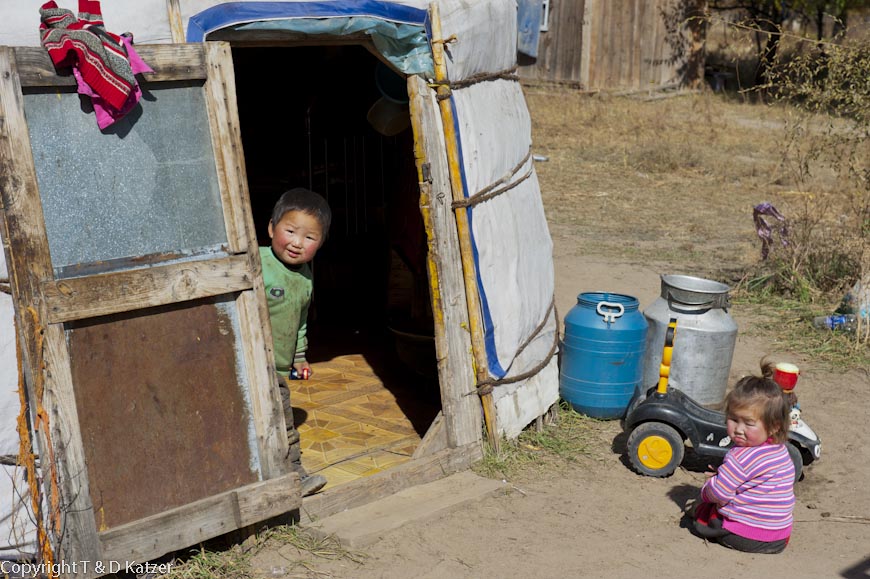
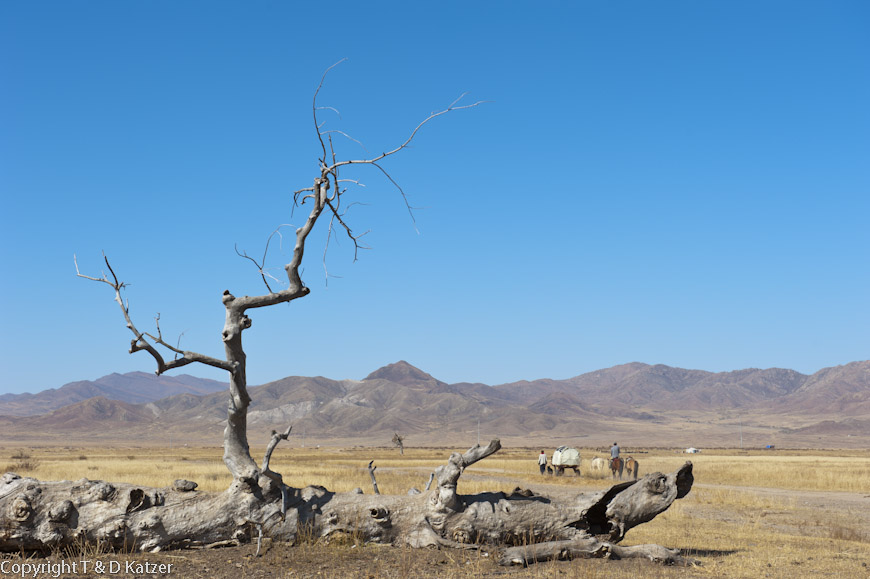
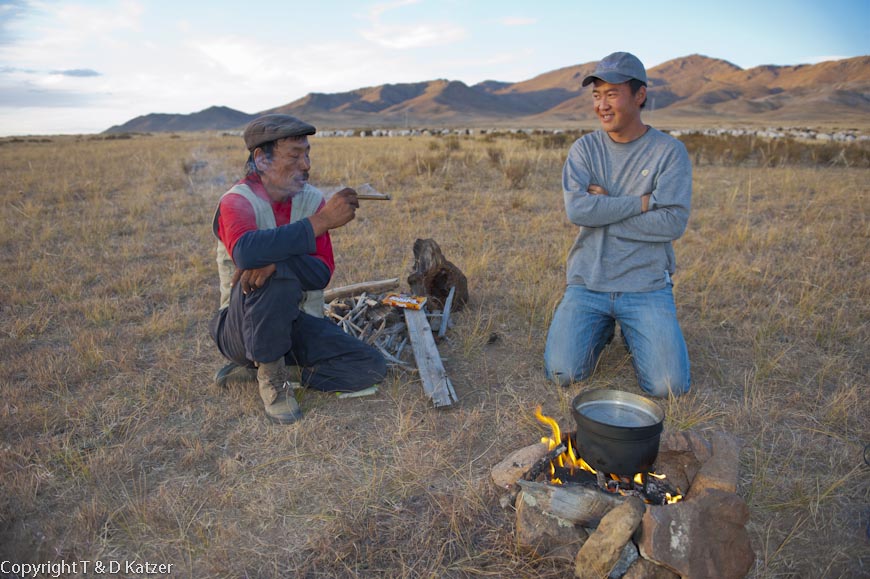
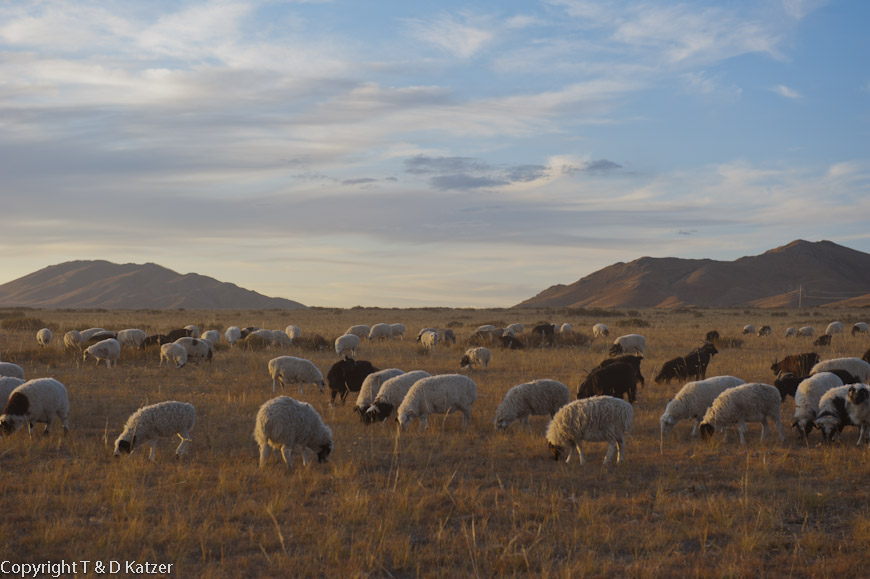
“Happy birthday to you! Happy birthday to you!” Tanja and I sing Ulzii a birthday song as we crawl out of the tent. “Thank you,” he says, delighted with the unexpected congratulations. Then we start with the camp routine and packing up our camp. The Selenge River Camp was undoubtedly one of the most beautiful camps of the trip so far. I find it almost a little difficult to leave this idyllic place with its trees now colored by autumn behind us. I pull up Sar on one of the many hills to look out over the sea of golden trees. They stretch along the watery Selenge River like an oversized anaconda. Just a few hundred meters from the river, the valley and the rising mountains freeze in dryness. Shepherds drive a large herd of sheep and goats through the enchanted valley. The beauty of this time of year is breathtaking. The horse-drawn carriage is just disappearing under the deep yellow canopy of a group of trees. Bilgee harnessed Sharga again today and we nailed two new horseshoes on his front hooves last night. I am surprised at how well I am now able to do cold shoeing and the associated hoof care. Never thought I would be able to use the knowledge I acquired in Germany about shoeing hooves in this way. The sellers of our two carriage horses gave us Sharga and Bor shod, but the job was so badly done that the two draught horses have now lost all their shoes.
A suddenly appearing pontoon bridge connects the two banks of the river. “We have to get to the other side,” says Bilgee and tries to pull Bor up the bridge ramp. However, he defends himself and stops abruptly. Tanja, Ulzii and I tie our horses to stakes standing around and help Bilgee get the heavy horse-drawn cart over the steeply rising bridge ramp. However, we have no chance. On the other side of the river, a man appears out of nowhere and comes running over to us. “You have to let one horse run ahead. Then the chariot horse follows,” is his suggestion. Tanya immediately fetches Sharga, who is also initially reluctant to step onto the metal bridge. The clattering of hooves on the unfamiliar surface is something new for the horses. With combined forces and cheering shouts, we make it after all. “I’m glad I don’t have to unload the wagon here again,” I gasp out of breath as I watch the wagon clattering over the floating bridge construction. “Me too. Saves us a lot of work,” says Tanja. After our six horses, Mogi and we arrive safely on the other side, we have to pay a toll of 3,000 tugrik (€1.71). There is not a human being to be seen for miles around and here, in the middle of the pampas, there is a barrier, a few yurts used as restaurants, a simple wooden hut and a sign on which the fees for using the pontoon bridge are written. We don’t stay long and ride past the yurts that smell of old grease. “A good place to get food poisoning,” I say, thinking of all the diarrhea I’ve had in the past few months.
At around 2 p.m., the thermometer reaches almost 40 degrees in the sun. We have left the life-giving Selenge behind us and ride through a completely dry valley. The stony ground does not make it easy for our horses. The horse-drawn cart bumps incessantly over the scree. “A disaster for all technical devices,” I say, thinking of our cameras, laptops and other electronics in the car as it shakes. We let our eyes glide over the dry valley in constant search of water for our animals and ourselves. As there are no yurts to be seen for miles around, which are usually located near streams or water sources, we are forced to ride on.
“What do you think of that mountain over there? Should we set up camp at its foot?” asks Bilgee. “What about water?” I reply. He points to a few yurts in the distance. “We take the horses there to water them,” he replies. “All right, off to the mountain then,” I decide in a good mood, happy to be able to heave my tired body off the saddle soon.
Once we arrive at our destination, the camp set-up routine begins as it does every day. In the meantime, everything has settled down perfectly. Everyone knows their tasks. You no longer have to explain every move to Ulzii either. Today, however, on his birthday, things are different. As soon as he has hobbled his horse, he disappears without comment and runs up the hill to phone his family from up there. With a lot of luck, in some cases you have a cell phone connection to the outside world from such an exposed location. Bilgee, Tanja and I go looking for wood in the meantime. Even if the situation here seems hopeless to find any, we are lucky again today to discover a few pieces of wood left behind by the nomads. “That’s enough for our dinner and breakfast,” laughs Bilgee, who is always friendly, helpful and full of energy. The fireplace is surrounded by stones and the wood crackles under the pot of water as Ulzii returns from his mountain. “And were you able to reach anyone?” I ask. “Yes, I was on the phone to my parents and a few friends,” he replies, groaning as he settles down by the fire. “Here, this is for you,” I say and hand him a fat cigar that we have cycled 15,000 kilometers from Germany through all those countries to Mongolia. (Trans-East Expedition Stage 4) As it is packed airtight, it still makes a passable impression after all these years. “Oh, thank you very much,” he says, visibly pleased. Tanja hands him a box of nut pralines, which further increases his joy. Then, to celebrate, Tanja unwraps two pina coladas, which are also packed airtight as freeze-dried powder. It’s not as if we have long drinks with us on expeditions. That would be fantastic but unrealistic. However, for very special occasions, we have a few packs of these tasty cocktail mixes, which weigh just a few grams. Mixing the powder with water in four small cups, we toast Ulzii’s birthday and enjoy the taste of a world that has become completely foreign to us. We laugh and have a good laugh as Ulzii lights up his fat cigar and takes a sip of pina colada. A bizarre scene in this remote landscape that we will certainly not soon forget.
“Sajn bajna uu”, (Good day) greets us a nomad who comes riding into our camp bareback on her horse. “Saa sajn bajna uu”, (Good day too) we reply and offer the young rider a place by our fire. She happily takes a cup of tea that Tanja hands her and joins Bilgee and Ulzii in picking meat from our cooked sheep’s head. Bilgee also offers me some of the delicacy he brought back from Selenge River Camp. The ram purchased and processed there is used down to the horns. None of it is thrown away. Simply everything is eaten. Since I don’t want to be a wimp, I scrape some meat from the animal’s jaw. But when my teeth lick at me and my eye sockets gape plaintively, I lose my appetite. “Don’t you like it anymore?” asks Bilgee. “Nope, nope, I’ve had enough of that head,” I reply, to which Ulzii and Bilgee laugh heartily.
During the feast, Bilgee talks to the shepherdess. He asks the young woman where she comes from. “From the yurt camp down by the stream,” she answers kindly. We learn that there is enough water for our horses. Bilgee always uses such visits to enquire about the way forward. Do we have passports waiting for us? What condition is the path in? How difficult is the climb? Will we be able to cross the mountains by horse and cart? Where are the water points again? Whether our animals find good grazing land to eat and much more. So we are usually informed about what is waiting for us the next day.
We look forward to your comments!

